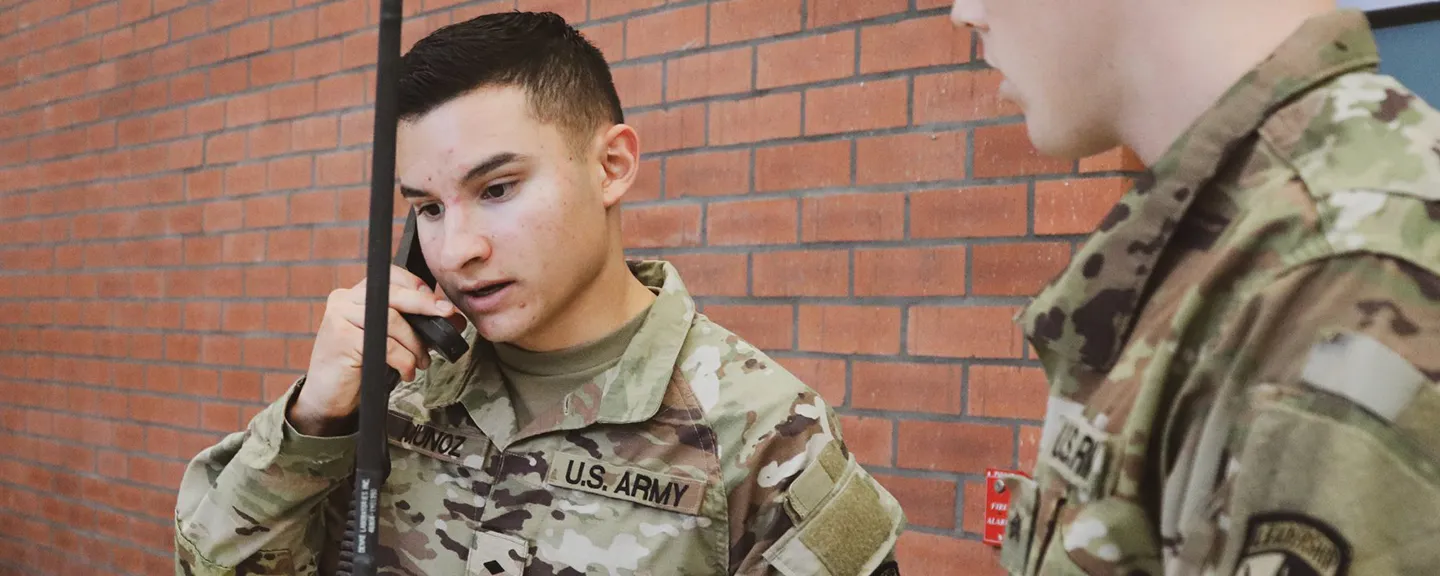- Home
- >
- APU Articles
- >
- News Article
What It’s Like to Be a College Student and ROTC Cadet
May 21, 2020 | Written By Ashley Eneriz

Many students also credit the program with helping them become the people they were meant to be. Cadets at Azusa Pacific University say this is especially true, because APU’s ROTC program helps create a tight-knit group of scholar-leaders who value service and dedication to country.
Here’s what you need to know if you’re thinking about attending APU and becoming a cadet with the ROTC program on campus.
What Are the Benefits of ROTC?
Enrolling in the ROTC program comes with several benefits, including specialized training and financial support for your education. Not only do many ROTC students receive scholarships, but a significant number also receive a monthly living stipend.
Many are more intangible. For example, current cadets and APU students, Armando Angel Muñoz ’20 and TeAta Gutierrez ’20, both got involved in ROTC early in their college careers and have noted that they appreciate the people the program is helping them become.
“Not only does the program equip cadets to become second lieutenants in the Army, but it also shapes more well-rounded, organized, and problem-solving individuals,” said Muñoz, who is graduating with a degree in criminal justice and a minor in biblical studies.
“The most positive aspect of my experience in APU’s ROTC program is seeing myself physically and mentally grow,” said Gutierrez, a public relations major. “When I began college ROTC, I remember being very shy, quiet, and doubtful that I was going to make it through the program.”
Gutierrez’s goal is to become a public affairs officer in the Hawai’i National Guard and an event coordinator. She explained that ROTC has helped her cultivate “the ability to think and overcome stressful situations that require critical thinking.”
What Does an ROTC Commitment Entail?
Making the ROTC commitment doesn’t interfere with your college and career goals. Instead, it’s an additional program that students enroll in for military leadership preparation. You can think of it as a minor that gives you the tools and experience you need to lead other military members.
As a cadet at APU, these are the typical ROTC requirements:
- Physical training (PT) three times a week
- One military science class a semester lead by cadre
- Training with other colleges on select Fridays
- Field Training Exercise (FTX) once each semester over a weekend at Camp Pendleton in Oceanside, California
- Summer training also available for cadets
What Are Some Common Myths About the Program?
Many people think that becoming an ROTC cadet means you’re signing up for boot camp alongside your college courses. But that’s not entirely accurate. The program is about so much more than making you physically fit! For instance, APU’s ROTC program is designed to help cadets become stronger mentally as well and thrive in challenging circumstances.
Another common myth is that by signing up for ROTC, you’re enlisting in the military right away. This isn’t true! There’s usually a trial period before you have to make your final decision on whether or not to enlist. Becoming an ROTC cadet requires eight years of military service, but you don’t have to serve in the military for the span of your entire career.
Is APU’s ROTC Program Right for You?
Gutierrez attributed her ROTC success to the close bonds she formed with other cadets in the program. “Although there are hundreds of ROTC programs in the nation, APU’s ROTC is special because it is more than a program,” she said. “It is a family and community.”
Muñoz echoed that ROTC is not just about creating military leaders, but also “more selfless individuals who aim to serve Christ in His calling for our lives.” He also noted that “through the often unseen work and time put forth to become leaders worthy of leading others in the Army, we strive to exemplify the true nature of the Service cornerstone here at APU.”
Wondering if an ROTC program is the right fit for you? Contact Azusa Pacific University’s ROTC program and talk with other cadets before making your final decision.